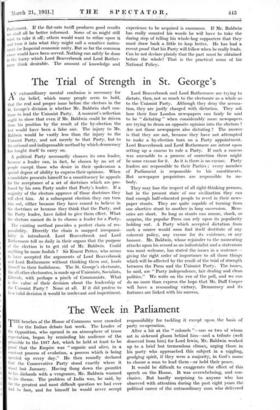The Trial of Strength in St. George's extraordinary mental confusion
is necessary for the belief, which many people seem to hold, that the real and proper issue before the electors in the St. George's division is whether Mr. Baldwin shall con- tinue to lead the Unionist Party. A -moment's reflection ought to show that even if Mr. Baldwin could be driven from his position by. the result of the by-election the test would have been a false one. The injury to Mr. Baldwin would be vastly less than the injury to the Unionist Party, and not merely to that Party, but to the rational and indispensable method by which democracy has taught itself to carry on.
A political Party necessarily chooses its own leader, because a leader can, in fact, be choSen by no set of people except thOse who desire in their spokesman a special degree of ability to express their opinions. When a candidate presents himself to a constituency he appeals for the acceptance of a set of doctrines which are pro- fessed by his own Party under that Party's leader. If a majority of the electors approve of those. doctrines they will elect him. At a subsequent election they can turn him out, either because they have ceased to believe in the doctrines or because they think that the Party, and the Party leader, have failed to give them effect. What the electors cannot do is to choose a leader for a Party.
The existing method provides a perfect chain of res- ponsibility. Directly the chain is snapped irresponsi- bility is introduced. Lord Beaverbrook and Lord Rothermere tell us daily in their organs that the purpose of the election is to get rid of Mr. Baldwin. Could anything be more foolish ? Sir Ernest Petter, who seems to have accepted the arguments of Lord Beaverbrook and Lord Rothermere without thinking them out, lends himself to their foolishness. The St. George's electorate, like all other'electorates, is made up of Unionists, Socialists, Liberals, with perhaps a pinch of Communists. What is the value of their decision about the leadership of the Unionist Party ? None at all. If it did profess to he a valid decision it would be irrelevant and impertinent. Lord Beaverbrook and Lord Rothermere are trying to dictate, then, not so much to the electorate as a whole as to the Unionist Party. Although they deny the accusa- tion, they are justly charged with dictation. They ask how their four London newspapers can fairly be said to be " dictating " when considerably more newspapers are trying to drum an opposite opinion into the electors ? Are not those newspapers also dictating ? The answer is that they are not, because they have not attempted to make a by-election turn on a Party appointment. Lord Beaverbrook and Lord Rothermere are intent upon setting up a caucus to rule a Party. If such a caucus was amenable to a . process of correction there might be some excuse for it. As it is there is no excuse. - Party leaders are responsible' to their Parties ; every member of Parliament is responsible to his. • constituents. But newspaper proprietors are responsible to no- body.
They may lose the respect of all right-thinking persons, but in the present state of our civilization they can find enough half-educated people to revel in their news- paper stunts. They are quite capable of turning from one abortive stunt to another in long succession. Mem- ories are short. So long as stunts can amuse, shock, or surprise, the popular Press can rely upon its popularity holding out. A Party which accepted dictation from such a source would soon find itself destitute of any coherent policy, any excuse for its existence, or any honour. Mr. Baldwin; whose rejoinder to the nauseating attacks upon his record as an industrialist and a statesman was most welcome, has stated the issues in a sentence— giving the right order of importance to all those things which will be affected by the result of the trial of strength between the Press and the Unionist Party. The issues, he said, are " Party independence, fair dealing and clean politics." We write on the eve of the poll, and we can do no more than express the hope that Mr. Duff Cooper will have a resounding victory. Democracy and its fortunes arc linked with his success.


















































 Previous page
Previous page